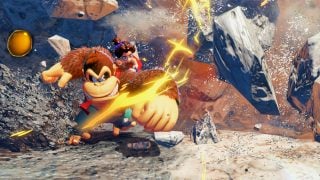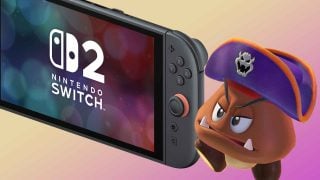During E3, Nintendo was asked by IGN about work-life balance and dealing with crunch culture, which has grown to be an especially hot topic in the games space over the past year or so. Fresh NoA president Doug Bowser offered a constructive response, citing the delay of Animal Crossing: New Horizons to next year as a case of putting workers’ priorities over the sanctity of a release date. The move was basically unanimously praised by the video game public at large, even as Nintendo’s stock took a hit at the announcement, and it ended up being one of our biggest news pieces of the conference, racking up thousands of retweets and tens of thousands of likes, as Nintendo reaffirmed its image as a considerate and comparatively just company in the face of many others.
Shortly after we initially tweeted the article, in the Nintendo Wire Slack channels, my colleague Jaxson Tapp – who was hitting the E3 floor in person – asked a reasonable question. “Did I miss something [Junichi] Masuda related when it came to the crunch thing? Why are people tagging him in the replies?”
As somebody keyed into the Treehouse stream, I knew the answer immediately. Hours earlier, Masuda had announced that Pokémon Sword & Shield would not allow the transfer of Pokémon that are not found in Galar’s Pokédex – essentially cutting a currently undetermined number of Pokémon from the game entirely. Citing scheduling concerns, balance issues, and the fact that this decision would have to be made eventually, Masuda was fairly upfront about the issue, speaking further of it in USGamer alongside game director Shigeru Ohmori, and later clarifying that there had not yet been a decision about whether or not non-Galar Pokémon will be patched in later.

The blowback was immediate. Pokémon announcements of all types tend to have mixed reactions these days, but this was one of the most virulently negative in recent memory. Players of several types – from National Dex completionists to shiny hunters to those who simply had emotional attachment to their old ‘Mons – decried the decision from every rampart on the internet. Twitter hashtags, Reddit threads, and comment sections were alight with unanimous rage. People called the reasoning behind the decision into question, highlighting a number of discrepancies between the purported factors and previously known facts. And soon, the event had a nickname – “Dexit”, a cheeky and admittedly clever reference to Brexit, a real life political situation that is similarly murky and fraught with tension.
People tended to fixate on the time concern most of all. The masses were perfectly fine with putting the game off for a few months – despite a couple bellyachers, reaction to the Animal Crossing delay was extremely positive once people heard the reason, and if it meant getting all the Pokémon in most wouldn’t mind waiting just a few more months for it. Where was the harm?
I thought about the issue for a while as I browsed forums and looked up news on the matter. And it soon became clear that while a delay sounds simple and good on paper, as does a host of other things Game Freak could do to remedy the situation, it’s not a cut and dry decision to make. In fact, it’s almost an inescapable dilemma – one that seems like a symptom of the growing pains that have been nibbling at the entire Pokémon franchise over the past decade.

It’s important to remember, before diving into the causations and effects of this issue, just how big Pokémon is in several ways. Game design, there are currently over 800 of the collectible monsters, each one with models to animate and movesets to tweak, alongside any potential changes Game Freak could make in the Galar region (how would, say, Dynamaxing affect individual Pokémon models? Would they have to test every single one?) Externally, meanwhile, Pokémon is quite literally the most lucrative media franchise in the entire world, with a total revenue of $90 Billion – almost 1.5x as much as Star Wars, for comparison, and nearly two decades younger. Even as purely a video game franchise, Pokémon is only behind Mario and maybe Call of Duty in terms of cash. It operates as a money maker on a scale that few, if any, are able to comprehend. Newline Pokémon games are the trunk from which all branches of the media empire – anime, manga, card game, and most importantly merchandise – expand. They are not games that exist in a vacuum – to rustle one out of place is to rustle the entire enterprise, and cause shockwaves that reverberate through each of its corporate entanglements.
Sword & Shield are currently slated to come out in November. They are, unquestionably, the commercial titan of Nintendo’s Holiday 2019 season. It’s not as if the rest of the year’s lineup is poor – it’s actually quite good, as E3 showed – but there is simply nothing within it that matches up to the sales standards of a Pokémon title. Fire Emblem, Link’s Awakening, and Luigi’s Mansion are solid pulls, but they’re A and B-listers – Pokémon is SSS-tier. The only Nintendo games that measure up to its level financially are Mario, mainline (non-remake) Zelda, and Smash Bros. Everything else is incomparable saleswise. Delaying the game past Christmas simply isn’t an option if Nintendo wants to post a strong Q4 – especially now since Animal Crossing is pushed back. As much as we wish to quote Miyamoto on quality and delayed games, within the economic climate in which Pokémon inhabits, that’s simply not feasible. Sword and Shield must release this holiday season – so demands the invisible hand of the free market. Look at how Nintendo’s stock dropped after AC’s delay, and imagine how much it would plunge if they did the same for Pokémon.
This explanation, on its own, should provide reason enough as to why the developers, who are on a strict timeline, have been forced to make a decision. But certain contingents of the internet, unsatisfied with this, have come up with counterclaims to the provided reasonings of balance, time, and budget constraints. They are right to be suspect to some degree, and their arguments are worth considering – but we should scrutinize reasoning on both sides carefully.
First is simply the time put into modeling and animating new Pokémon. A valid excuse at a glance that becomes trickier when one considers that the models and animations used in Sword & Shield appear to be identical to those used in Gen VI/VII, simply upscaled and retextured. Game Freak originally modelled Pokémon for 3DS at a higher scale than the console can render, theoretically future-proofing them for consoles more powerful like… well, the Switch. Not to mention they’ve already had a trial run (and hopefully some groundwork) with the Let’s Go games. Shouldn’t it be a simply copy + paste job, if that’s the case?

Well, if there’s anything I’ve learned from listening to any game developer for longer than five seconds, it’s this: game development is never as simple and easy as it sounds, and complications are likely to occur with almost everything you do. Yes, the Sword & Shield models and animations don’t look greatly updated compared to those of previous gens, and I doubt they’ll be that much more refined before release. But to assume that it’s a matter of pure C + V is at least a little shortsighted, and doesn’t take into consideration all the things Game Freak also has to add to the games. As New Frame Plus showcases, animation and assets in Pokémon games have gone through a lot of evolutions and a lot of work. I’m sure there is a fair legitimacy to the suspicion towards the idea that the animations take up too much time, just as I’m sure that there’s at least a kernel of truth behind those same assertions in the first place.
One that people are harping on slightly less is the “balance” comment Masuda made, noting that Pokémon hasn’t been balanced for… basically ever. Obviously in a more controlled environment where they can freely pick and choose which Pokémon will even make it into the game, they’ll have a much easier time curtailing the metagame… in theory. Game Freak doesn’t exactly have a stellar track record when it comes to competitive balance, considering most competitive resources (Smogon, etc.) are community-driven in the first place. Of course, it’s difficult to see how this will pan out before the game releases, so I can’t offer much more than a “wait and see” outlook – though I would say skepticism towards this matter is warranted.
But of course, the main one, again, is time and money. If delaying the game is unfeasible (as it is), then there are two options – take on a load of additional staff, or crunch. The former seems reasonable on paper, considering the aforementioned money Pokémon as a franchise deals with, but there are too many unknown factors at stake (the current size of Game Freak’s staff and how their management is structured, how much of that $90 billion the company actually gets to work with, etc.) to properly assess the viability of such an option. The latter is, I would hope, off the table: it would not only make Nintendo hypocritical after Bowser’s comments, but just be a morally reprehensible thing to do, because – and I’m going to say this loudly and clearly – the lives and well-being of game developers is far more valuable than the bytes of data that they work with. I completely understand the emotional stake people have in this issue – I do too – but it’s not worth working them to the bone over.
So it appears to be an impasse. Game Freak can’t delay the game, because too much of Pokémon’s multimedia empire and Nintendo’s yearly reports depend on its arrival. It (hopefully) doesn’t want to abuse its staff in order to ship the game with every Pokémon available. So it’s resolved to cut some losses, which – as Masuda states – is likely something that would have to happen eventually. The series as a whole has been ballooning in size ever since its inception, and at some point its scope has simply gotten out of hand. In a certain way, this decision, whether it would happen now, in Gen IX, or beyond, was inevitable.
But does that mean we have to grin and bear it?
I was pretty devastated to hear the news when it broke. I’ve been transferring each of my main Pokémon teams from each game I’ve played since Gen IV. They’re all still in my Sun file’s PC – teams named after the casts of Metal Gear, Final Fantasy IX, and Xenoblade; multiple Ampharoses and Raichus (I like Electric types, ok); and my Typhlosion Backburner, whose name was cruelly wiped in the V -> VI transition because her name unknowingly contained a French word for a naughty thing (sacre bleu!) There are shinies I’ve received as birthday presents, legendaries I scrounged through multiple games for, and an eclectic collection of Alolan Pokémon that formed my first completed regional dex. I won’t be able to take them all into Sword & Shield, and that breaks my heart.

I’m usually pretty complaisant with new Pokémon gens. When people raise complaints of sameness and lack of innovation, I just truck on through with new Pokémon and have a grand old time. I enjoy the little nuances and iterations – Gen VII was probably my second favorite set of games in the entire series. While I haven’t been gaga for Pokémon in the same way I was when I was 3, I still consistently enjoy the series. And yet, this announcement was the first I can remember, in my two decades of fandom, that gave me pause. That made me consider whether to actually pick up Sword & Shield.
Ultimately, I probably will, unless they announce some other drastic omission. But in the process of analyzing the particulars of this one issue, I became more and more aware of a general malaise that has been plaguing the franchise for some time. Pokémon just keeps growing, and growing, and growing… and people are getting more and more upset as time passes. Is this not a flash in the pan? Is there something deeper, more insidious that has crept up beyond this one singular issue? Is the Pokémon fanbase in an irreconcilable position with both Game Freak and itself?
That question will have to wait for another day. In Part 2, we go deeper, beyond the symptom, into the disease.


